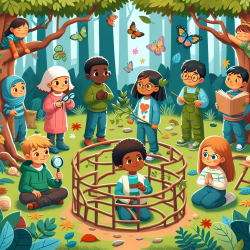Unleashing the Power of Nature in Early Childhood Education
In an era where environmental concerns are at the forefront, integrating nature into early childhood education is more crucial than ever. The research paper, "Early childhood environmental education: A systematic review of the research literature," sheds light on how nature-rich experiences can enhance educational outcomes for young children. This blog explores the key findings and how practitioners can harness these insights to improve their educational practices.
The Research at a Glance
The systematic review analyzed 66 studies over 25 years, focusing on early childhood environmental education (ECEE) programs. The research highlighted the significant benefits of nature-based learning, which include:
- Environmental Literacy Development: Children develop a deeper understanding and appreciation of the environment.
- Cognitive Development: Nature-based activities enhance cognitive functions such as problem-solving and critical thinking.
- Social and Emotional Development: Interactions in natural settings foster social skills and emotional regulation.
- Physical Development: Outdoor activities promote physical health and motor skills.
- Language and Literacy Development: Engaging with nature can improve language skills and vocabulary.
Implementing Nature-Based Learning
Practitioners looking to incorporate these findings into their teaching can consider the following strategies:
- Integrate Play-Based Learning: Encourage free play and exploration in natural settings to stimulate curiosity and creativity.
- Facilitate Social Interactions: Organize group activities that promote teamwork and communication among children.
- Encourage Reflective Practices: Use journaling or art to help children express their thoughts and feelings about nature.
- Promote Action-Taking: Involve children in simple environmental projects like recycling or planting trees to instill a sense of responsibility.
Overcoming Challenges
While the benefits of ECEE are clear, practitioners may face challenges such as limited access to natural spaces or lack of resources. Here are some solutions:
- Utilize Local Resources: Use community parks or school gardens to create nature-rich experiences.
- Incorporate Nature Indoors: Bring elements of nature into the classroom through plants, natural materials, and nature-themed activities.
- Engage Families: Encourage parents to participate in nature-based activities at home or in local settings.
Encouraging Further Research
While the current research provides a solid foundation, there is always room for further exploration. Practitioners are encouraged to contribute to the field by documenting their experiences and sharing insights on the impact of ECEE programs.
For those interested in delving deeper into the research, the original paper offers a comprehensive analysis and can be accessed here: Early childhood environmental education: A systematic review of the research literature.










